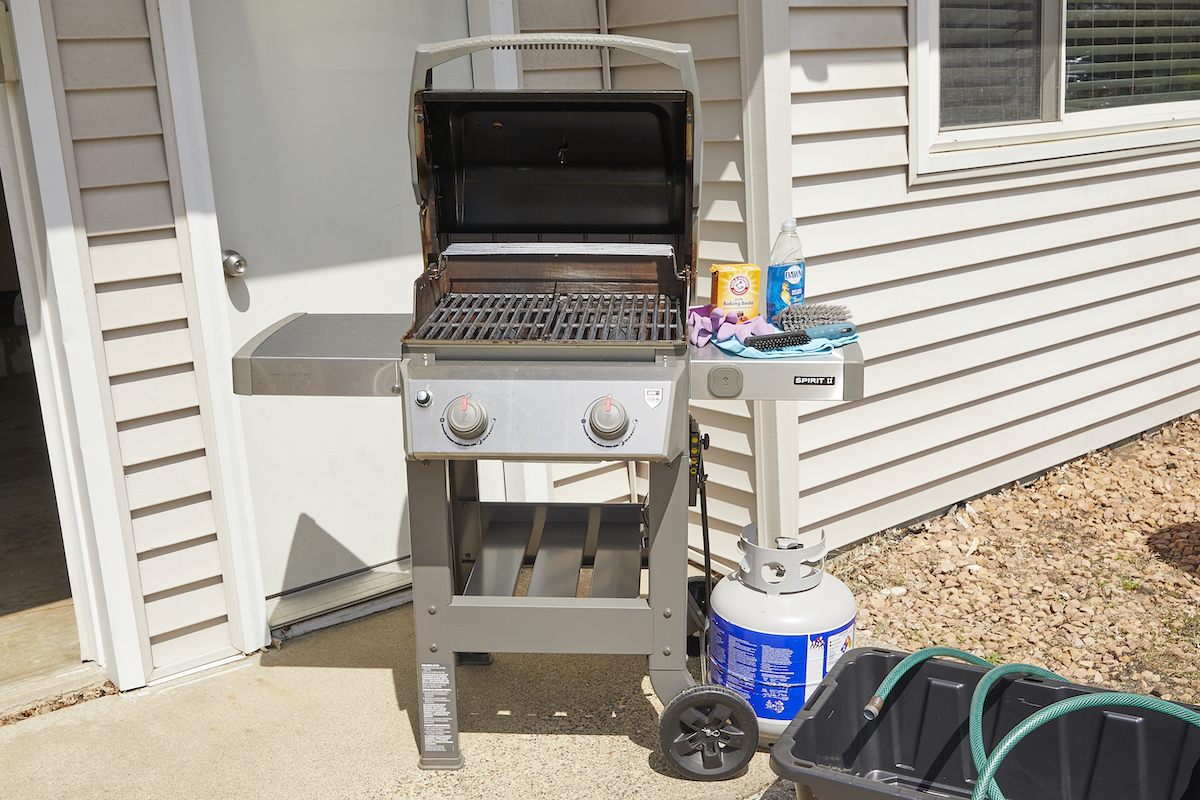

We may earn revenue from the products available on this page and participate in affiliate programs. Learn More ›
Cleaning a gas grill ensures that one of the most loved rituals of summer—friends and family gathering together in the backyard to enjoy hot-weather fun and feast on succulent delicacies—goes on. If the gas grill hasn’t been cleaned in a while, those fire-roasted treats might leave a lot to be desired. Accumulated residue can make food stick to the grates, contribute to flare-ups, and even lead to grease fires.
For the most delicious—and safest—cookouts, it’s a good idea to perform a thorough cleaning once or twice a year, either in preparation for the grilling season or before you store the grill for the winter. By following the simple steps outlined below, you’ll learn how to clean a gas grill and help extend its life to ensure plenty of summers’ worth of tasty meals.
Tools & Materials
Bobvila.com may earn a commission from purchases made through these links.
Step 1: Fill two large basins with soapy water.
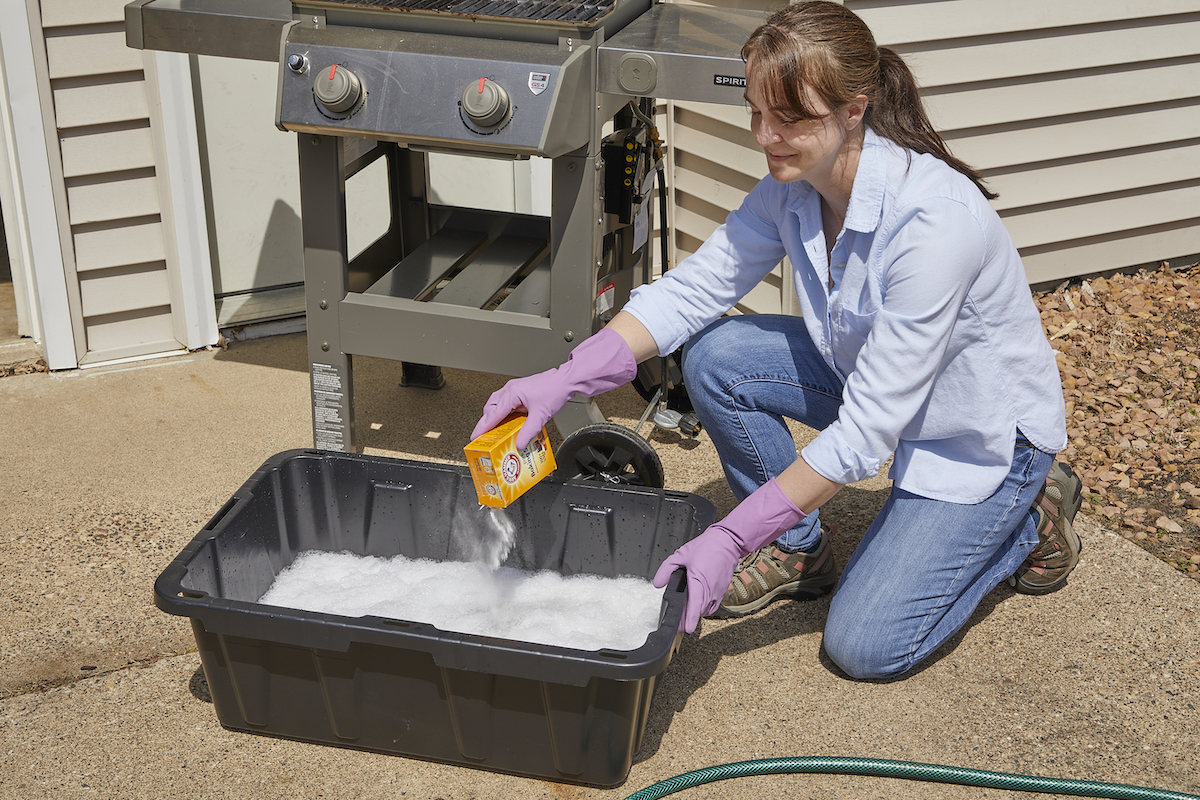
If your gas grill hasn’t had a good cleaning in a while, start by filling two large buckets or basins with warm, soapy water. Dish detergent is your best bet here because it works well on metal, but you can add some baking soda for extra cleaning action.
Unlike with charcoal grills or charcoal kamado grills, it’s important to consider safety and protection of gas connections when learning how to clean a propane grill. Before cleaning the grill, make sure the valve on the propane tank is closed.
Though this should go without saying, cleaning a gas grill is a task to accomplish only when it’s completely cool to the touch and, ideally, hasn’t been used that day. (You’ll have a tough time flipping all those burgers and vegetables later on if your hands are covered with second-degree burns!)
Step 2: Remove the grill grates and and soak them in the soapy water.
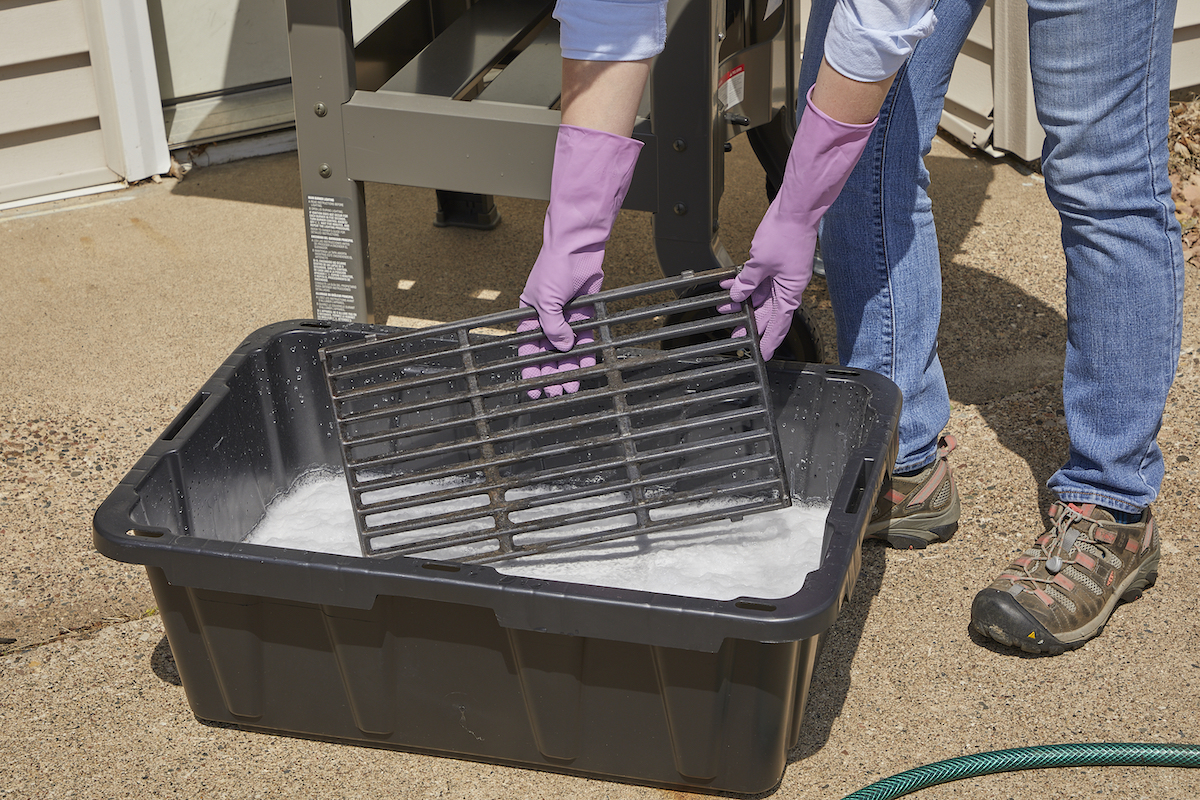
Remove the grates and submerge them in the water, letting them soak for about an hour. Also, take off any other removable parts, such as the drip pan and heat shields, and set them aside for now.
Step 3: Scrub away loose ash and debris from the grill’s interior.
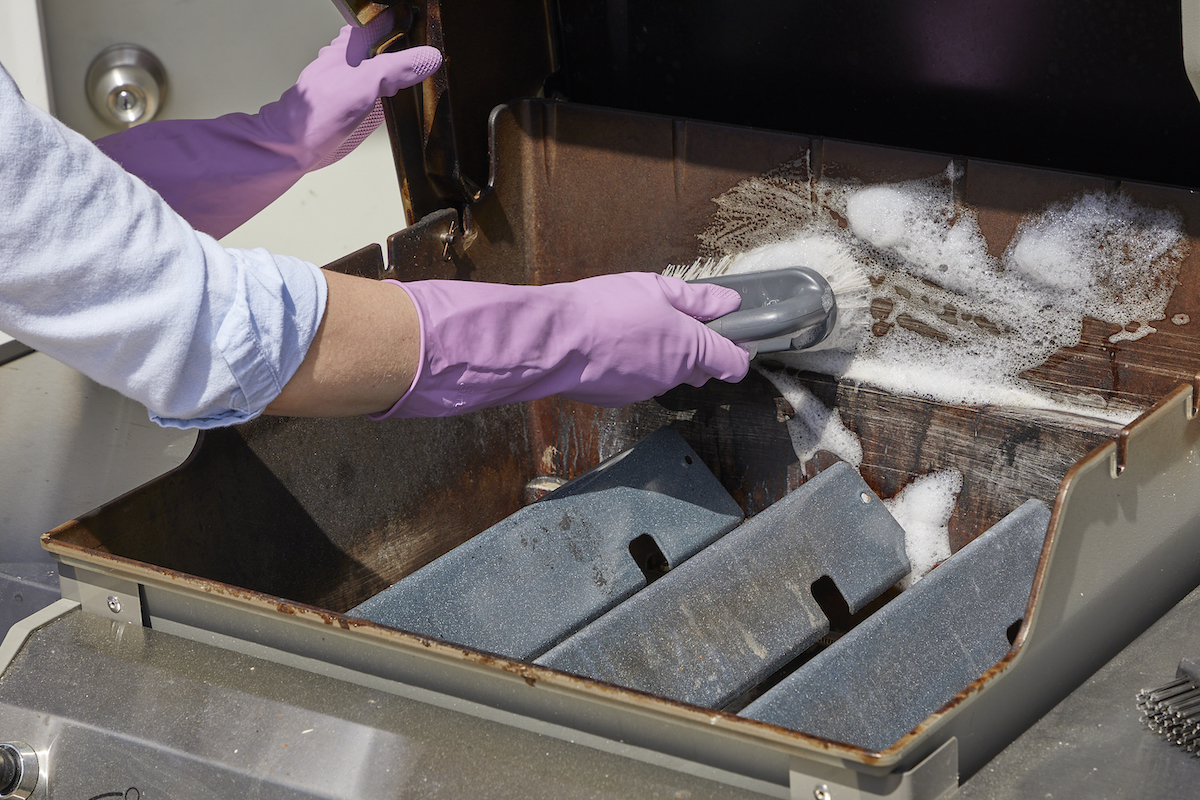
Taking care not to jostle any of the gas grill’s connections to the propane tank, use a rag to clear out loose ash and debris from the inside of the grill. Then, go back over your work with a wire-bristle brush to scrub off any caked-on char, grease, and other residue. Remove as much of this as possible from the grill’s interior.
Step 4: Wash removable grill parts, like heat shields, in soapy water.
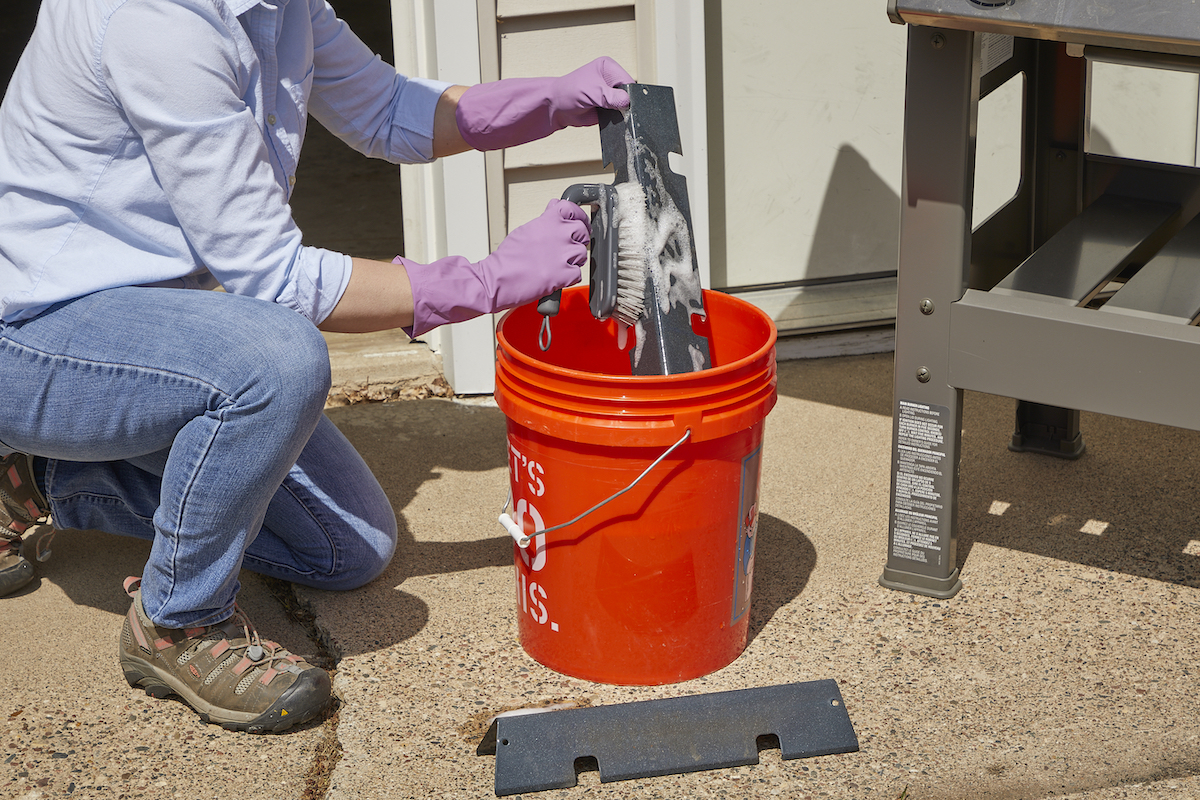
Most gas grills have heat shields or deflectors to help distribute heat within the grill. Try a degreaser for grills to scrub off any residue, carefully following package directions. Clean ceramic briquettes with a wire brush and wipe them clean; avoid spraying degreaser on the ceramic briquettes.
Lava rocks are too porous to clean, and you might find it easier to replace them with ceramic briquettes to keep your grill fresh. Dump debris from the grill’s drip tray and clean it with soap and water.
Step 5: Use a brush to scrub away greasy residue on the grates.
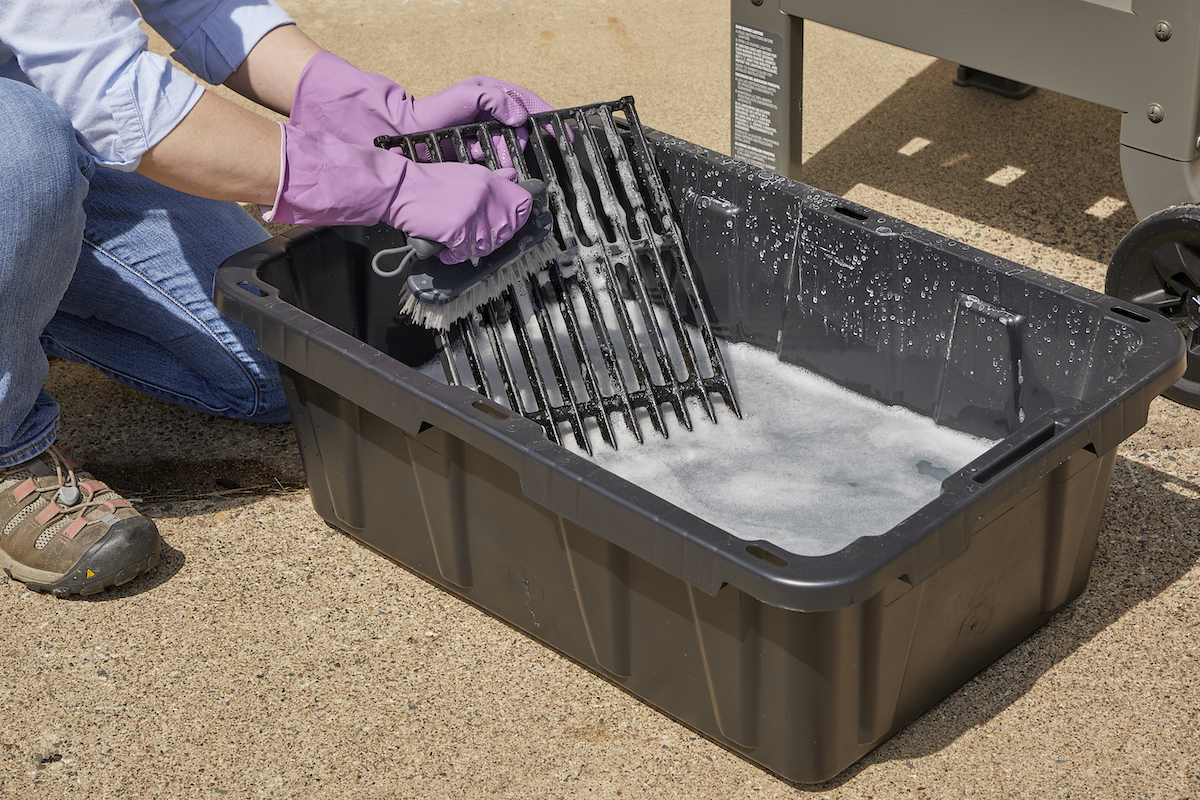
Go back to the grates you’ve been soaking in the warm, soapy water. The gunk should have started to loosen and fall away, but you’ll probably have to put in some elbow grease to get the grates clean. You may need to use a combination of rags and brushes to remove the greasy residue.
Wire brushes work best on metal, but they can scratch porcelain grill grates. Avoid using a metal brush and choose a nylon brush for cleaning porcelain and stainless steel grates.
When considering gas vs. charcoal grills, you might think gas grills take more work, but you don’t have to dump ashes regularly—a dirty job at best. With concentrated effort at cleaning the gas grill, you eventually will get the results you want. When you’ve finished, allow everything to dry completely.
Step 6: Put the grill parts back in place, check the burners, and clean the exterior.
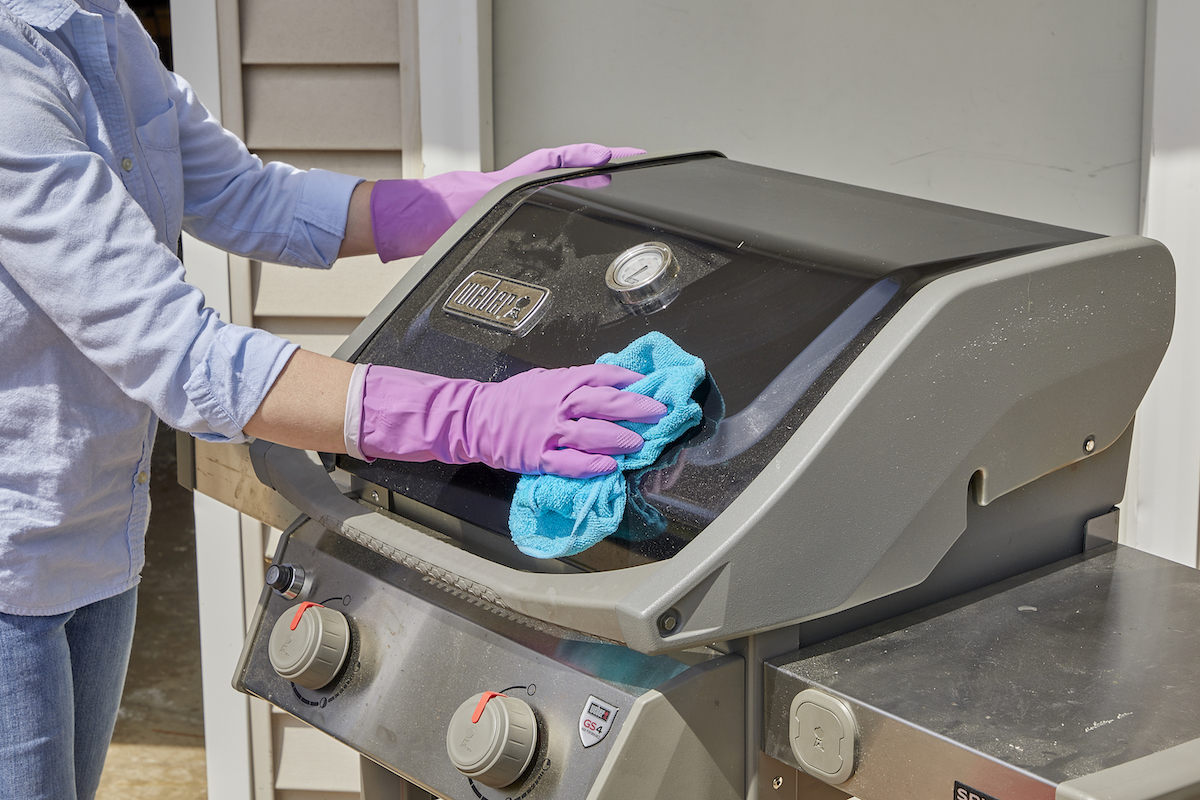
Once all the grill’s parts are dry to the touch, it’s time to put them back in place. Give the grill exterior a good wipe down using a microfiber cloth and soapy water. Then, open the valve on the propane tank and turn on the burners to make sure they’re working properly and that the heat shield(s) are correctly positioned. When you’ve confirmed that the grill is in good working order, you can consider it a job well done—which, some rare-steak lovers might insist, is the only acceptable way to use those words around a grill.
Tips for Keeping a Gas Grill Clean
Regular maintenance is important to keep your grill operating at its maximum potential, extend its lifespan, and ensure the best flavor from your grilled foods. These regular steps show the best way to clean a gas grill after each use to minimize future effort and keep the grill in good working order.
- Every time you grill, start by preheating the grates and brushing them clean with a wire-bristle or nylon brush.
- After cooking, brush residual clumps of food off the grates.
- Periodically sweep debris and grease out of the cooking chamber, and empty the drip pan frequently.
If you stick with this simple cleaning routine, your end- or beginning-of-season overhaul will be a breeze, giving you more time to enjoy those precious summer days.
The Importance of Cleaning Gas Grills
Our favorite grill brands might be tough and durable, but all grills need some regular sprucing up. Grill grates and parts are regularly subjected to extreme heat, grease buildup, and environmental factors. Learning how to clean your gas grill will help keep it safe and in good working order. Regular cleaning of a gas grill also cuts down on excess smoke and can improve the taste of the food grill masters work so hard at preparing.
Cleaning Gas Grills with Professional Tools
These instructions show you how to clean a grill with items you probably already have at home, ut there are also professional tools and formulas on the market that can help you get the job done: Grill cleaners help degrease and clean common grill surfaces, and grill brushes can get into the nooks and crannies around the grates. Be sure to consult the grill manufacturer’s instruction manual and confirm that the professional tools are compatible with your grill’s surfaces.
Final Thoughts
Knowing how to clean a gas grill can help keep your grill in good condition and your food tasting delicious for outdoor gatherings. Once you get the process down, you are on your way to enjoying years of family cookouts, so check these tips and the FAQs below and always double-check instructions that come with grills and cleaning products.
FAQs
Q. How do you clean a gas grill with vinegar?
Mix 2 cups of vinegar with 1 cup of baking soda. You can use this mixture on a wire brush to scrub the grill or spray it directly on the grate from a spray bottle. If the grill grates have a lot of built-up debris and grease, you can place this solution in the same sort of bin you used for soapy water, then seal it to allow the grates to soak.
Q. Is it OK to power wash a gas grill?
There is some debate around whether this practice is a good idea. First, you need really strong gas or electric pressure washer to clean a grill effectively. Second, you’ll want to protect the grill by disconnecting the electric start and propane tank. You also can tape a plastic bag around the regular connection once you disconnect it. If you feel comfortable with this approach, you might be able to power wash the grates, lid, and outside in 10 or 15 minutes.
Q. How do you clean a gas grill without chemicals?
Good old vinegar and baking soda can clean a gas grill well without using chemical products. Many dish soaps that claim to remove grease from dishes also can aid your chemical-free cleaning efforts by helping dissolve built-up grease.
